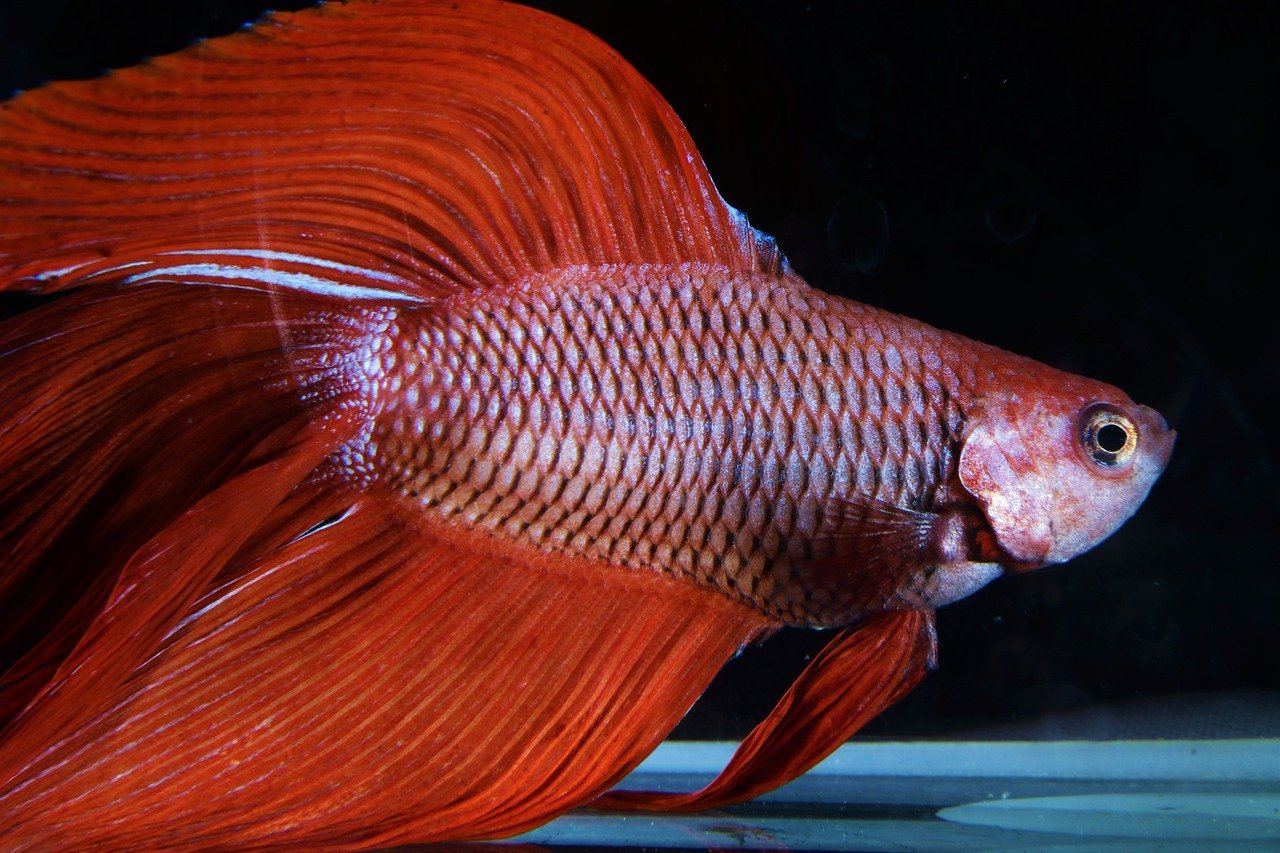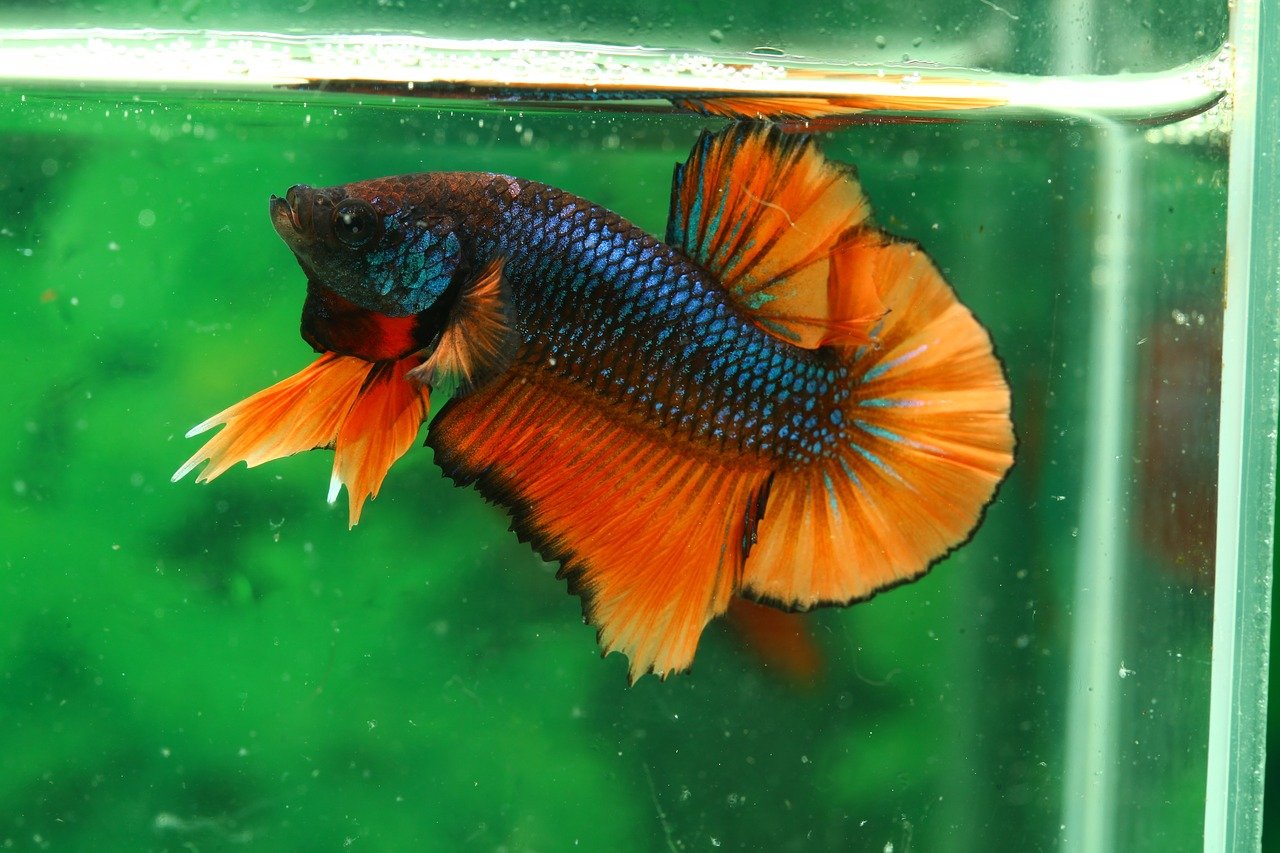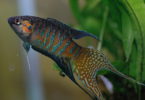Last Updated on February 10, 2023 by Matt
If you have ever noticed your betta floating motionless in its betta fish tank or tucked between your decorations, they are most probably sleeping. This is a question asked by many new betta owners, and the answer is yes, betta fish do sleep. In fact, most fish sleep or at least rest during the night, but bettas have unique ways of getting themselves comfortable, and it is fascinating to watch!
That being said, if you see your betta floating at the surface completely motionless, check to see if their gills are still moving, as this will tell you that they are definitely asleep and not dead.
In this article, we will discuss where your betta will sleep, how to encourage your betta to sleep, and any worries you may have if your betta is not sleeping.
IN THIS ARTICLE
How do Betta fish sleep?

Even though betta fish do sleep, it is not quite the same as ours, or the sleep that a land animal would have. Bettas are very light sleepers as in the wild they would have to wake up and swim away or defend themselves from land predators, other fish and any dangerous natural occurrences that could harm them. They are still light sleepers in captivity, and will wake up from the slightest movement, even if they were bred in captivity, bettas have a natural instinct to protect themselves and their home.
Betta fish sleep with their mouths slightly open, and in various positions, make sure that their gills are moving, and their mouth is moving slightly as this indicates that they are breathing and are perfectly alive. They sleep throughout the night so if you notice your betta settling down or floating motionless when the lights go out, this is completely normal. However, they are known to have a nap during the day, we do suggest taking a close look at your betta if they seem asleep during the day, as floating at the surface could be a sign of illness or death if they are not moving.
Betta fish sometimes lose their color and become slightly pale during their sleep, this is known to be an instinctive survival technique so that they are less likely to be seen amongst plants and debris in the wild, to prevent any predators spotting them. So, don’t panic if this happens, they will start to brighten up again once they become active.
Bettas do not have eyelids, so their eyes do not give us an indication to whether they are asleep, their eyes will always be open whether they are asleep or dead. As we said before, look at their gills to see if they are breathing (their breathing will be slower than when they are active), if they are then your betta is just having his afternoon nap, which is completely normal.
Do betta fish only sleep at night?
Even though bettas do not sleep in the same way that we do, they do require darkness during the night for them to know when to sleep and be less active. Bettas can sleep both in the day and during the night, but they will sleep for longer periods of time in the night compared to the day where they may have a few short rests. It is important to have a reliable light source in your bettas enclosure to give them a clear night and day routine, and make sure their light is turned off during the night. Many LED aquarium lights can be programmed with a daily lighting rhythm.
Do betta fish hibernate?
Many new fish owners believe their betta is hibernating due to the inactive behavior that occurs during the winter months. This is a myth that is certainly not true, bettas do not hibernate. If your betta is acting as if they are hibernating by hiding away and not moving for long periods of time during the day, it is most likely due to cold water temperatures. In the cold winter months, the aquarium’s surroundings will also become colder, so their heater or thermostat may need raising in order to keep the warmer temperatures consistent throughout the year.
The temperature should be around 80 – 83°F, and if the temperature drops below 76°F, this can cause your bettas body to go into shock and will cause their metabolism to slow down, the tank needs to be heated up to the correct temperature immediately if this occurs.
Do Betta fish sleep on the bottom of the tank?
Betta fish can often be found laying on the bottom of the tank on top of the substrate, this is pretty normal, however they usually prefer to sleep somewhere more hidden. If you move towards the tank, your betta should swim away or move around, if you make noise and movement and your betta still does not move from the substrate, it may be an indication that your betta is sick. There are a number of reasons why your betta might be laying on the bottom of the tank, one being the use of an incorrect filter. If your filtration system is too strong, the water can come out of the outlet tube very fast and create fast flowing water. Even though they can survive rough currents in the wild, they prefer slow flowing water, so your betta may be staying at the bottom of the tank to avoid the rougher water current at the top.
Another reason is if your betta is sick, whether they are suffering from parasites or the water conditions are not correct. Bettas thrive in warmer water; cold water encourages parasites to occur and will also make your betta lethargic. This can cause them to sink to the bottom and not move until the problem is solved. To find out the conditions a betta fish need to be kept in, see our Betta Fish Care Guide.
Do Betta fish sleep on their sides?
These fish are found sleeping in many strange positions, one being on their side. They often do this on plants, on the substrate or just floating in the water; it is great to ensure your betta tank has lots of different plants to make them feel safe whilst they are sleeping. Java moss, java fern and an Anubias plant are suitable options for a betta’s sleeping area, Anubias plants have large, cupped leaves that make great betta beds!
As well as sleeping on their side, bettas are also found sleeping vertically or curled up. Even though it can look odd, and often worrying, this is perfectly normal – as long as their gills and mouth are still moving slightly. They can also be seen wedged into small gaps in rocks, decorations, plants, or anything else in your aquarium, if your betta has a habit of doing this, we suggest monitoring your betta to make sure that they can get out of the gap and not hurt themselves.
If your betta is sleeping on its side for a long period of time, especially during the day, without moving, it could be a sign that something is wrong. As well as laying on the substrate, laying on their side can also be a sign that the water conditions are incorrect, encouraging the ammonia levels to rise, giving them ammonia poisoning. The temperature can also affect the way they use their bodies, a sudden change in temperature can shock the body and cause them to stay in one position for a long time.
If your betta is swimming on its side, or attempting to, it could have swim bladder disease. This disease affects a bettas ability to move properly and also affects their buoyancy.
What do Betta fish sleep on?
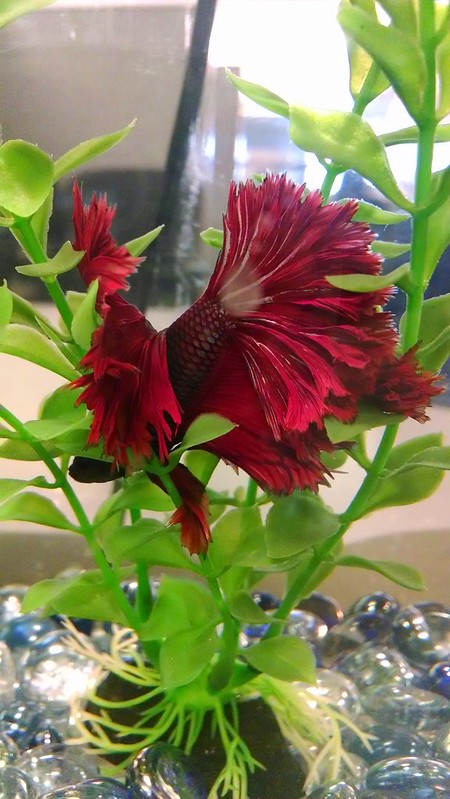
Betta Fish sleeping in a plastic plant. Credit: scpetrel (Flickr)
Bettas like to settle on a leaf or somewhere that they can fit onto, however they will also happily sleep floating in the water with nothing surrounding them. We recommend giving your betta a few sleeping spots around the aquarium where they can rest, this also gives them somewhere to hide if they feel threatened or scared. Betta logs are a great way to give them a hiding space that is at a different level, as they float at the top of the water. Betta fish plants can also offer a napping spot. Whilst giving your betta a hiding spot and sleeping area, they can also prevent boredom.
- 2 Pack Of Zoo Med Floating Betta Log
- Provides a perfect place for your betta to sleep play, breed, feed, or blow a bubblenest.
- Helps reduce boredom from captivity and stimulates natural betta behaviors.
- Inspired by bettas’ wild environment and designed to look naturally great in any betta enclosure.
- To use, simply place in your aquarium out of the package, and let your pal find it on his own.
When they do sleep on leaves, they usually pick those with large broad leaves, as mentioned before the best live plant for this is anubias. If you do not have a planted tank and you would like to give your betta somewhere to sleep, betta leaf hammocks are a great and affordable alternative. They are realistic leaves attached to a suction cup that you can place anywhere around the aquarium onto the glass. Here are some affordable betta hammocks:
Why is your betta sleeping all the time?
All bettas are different and have different sleeping patterns, however a sign of good health is sleeping at night and being active during the day, with the exception of a few naps. If your betta is sleeping for long periods of time and for most of the day, then something is most likely wrong, your betta may be sick or struggling to be active in their tank conditions. One exception is the age of your betta, if they are coming to the end of their life (of 3-4 years), they will sleep much more than when they were younger, this is purely due to energy levels. If your betta is around the age of 3-4, let him sleep and try not to disturb him, but we do recommend checking him over closely for any signs of disease or sickness just in case.
As bettas know when to sleep and when to be active from the light source, leaving the tank lights off for too long may be encouraging them to sleep more even if it is during the day. They should have around 8-12 hours of light and 12-16 hours of darkness, it is important to use a reliable light that will work correctly while you are not home. Make sure the light is not too dim and low, otherwise your betta might mistake the low lighting for night-time.
Another reason why your betta may be sleeping to much is boredom. Bettas are known for getting bored and lethargic in a tank that is too small and too empty. Make sure the tank is at least 10 gallons and that there are plants, decorations and hiding spaces. Feeding your betta a range of different foods is also a way to release their boredom and stimulate their natural behaviors. If your betta seems bored and lonely, adding some compatible tank mates may help this, however you may have to get a bigger tank to give all the fish enough room. To find compatible tank mates for your betta, see our Betta Fish Tank Mate article.
One of the main reasons for a betta to be inactive and sleeping during the day is that they are suffering, usually form incorrect conditions. As previously mentioned, the temperature of the water should be 80 – 83°F, if it gets too slow it can become a breeding site for parasites, as well as the actual cold water causes a bettas metabolism to slow down. Other problems your bettas might be suffering with includes dropsy, ich (white spot disease), or ammonia poisoning.
What to do if your betta does not sleep
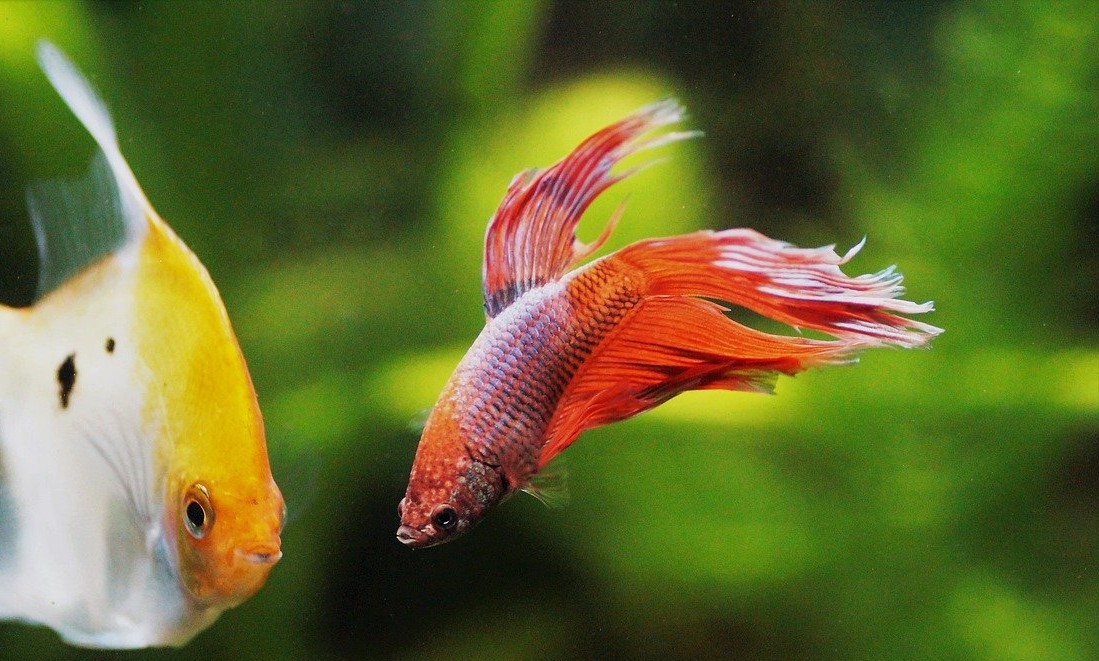
As well as a betta that sleeps too much, a betta that does not sleep at all can also be a concern! There are a few ways that your can encourage your betta to sleep:
Provide hidden areas – During the day, bettas prefer to nap in shaded areas that are not in the direct light, usually in between leaves, underneath hides or rocks, and amongst foliage. A bright, empty tank can make sure betta feel exposed and unsafe, and they will not want to sleep as this can make them vulnerable. Make sure the tank is not by a window or any other bright lights in your home. Adding in hiding spots and thick foliage will replicate their natural environment. Also ensure that the betta filter isn’t causing too much circulation.
Turn off the lights – To make sure your betta sleeps during the night, ensure the aquarium lights are being turned off at night. The best way to do this is using a timer that is attached to the lights, these can be set to your desired time.
Conclusion and recap
All betta fish sleep during the night with occasional naps during the day. Make sure your bettas tank is full of hiding spots and foliage, also check the water conditions to ensure your betta is living in the correct environment.
Here is a quick recap of what we’ve mentioned in this article:
- Bettas sleep with their eyes open, gills moving and in unusual positions
- Sleeping during the day is normal, but only for short periods of time
- They lose their color slightly when sleeping
- Bettas do not hibernate
- The water should be around 80 – 83°F
- A betta sleeping to much during the day can be a sign of illness – check for parasites and abnormal behavior
- Anubias plants and betta hammocks are great sleeping spots

